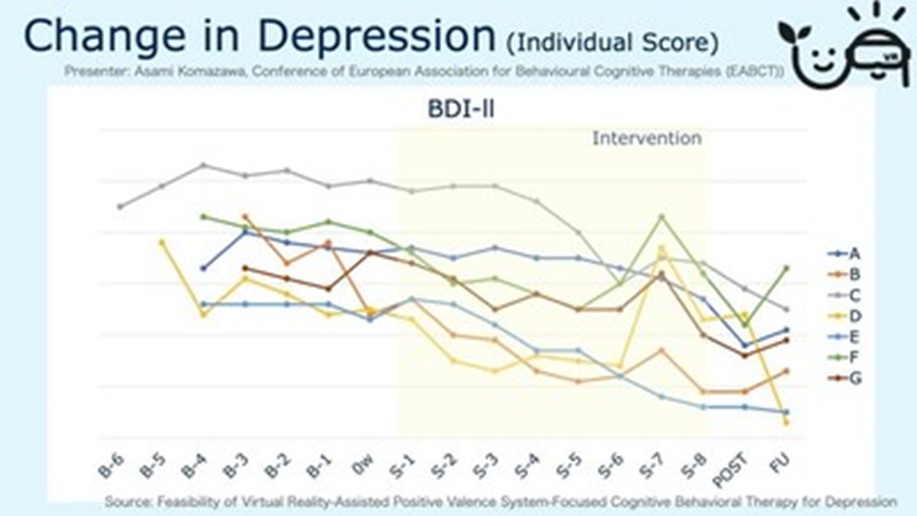Presented at the international conference of the European Association for Behavioural and Cognitive Therapies
TOKYO, Sept. 17, 2021 — Jolly Good and National Center of Neurology and Psychiatry have verified the efficacy of using VR in Cognitive Behavioral Therapy (CBT) for patients suffering depression in Japan. Results indicate improvement in the scores of the targeted patients with depression. Use of VR caused no adverse events, demonstrating that VR can be used safely in the CBT for of depression.
This research was conducted by the Japanese medical startup company Jolly Good Inc. and the National Center of Neurology and Psychiatry, Japan’s largest cognitive behavioral therapy research institute. The result was presented at the international conference of the European Association for Behavioural Cognitive Therapies (EABCT) held in Northern Ireland on Saturday, September 11, 2021. (Presenter: Asami Komazawa) (https://eabct.eu/)
Outline of research
In this study, we selected 57 VR scenarios aligned with the concept of PoCot (Positive Valence System-Focused Cognitive Behavioral Therapy for Depression). We asked 7 patients with depression to practice “liking experience” (One of the practices of PoCot) with VR, during weekly face-to-face sessions, as well as between the sessions.
Many studies have been done on VR, but most pertain to healthy people or anxiety. Research using VR on patients with depression who attend medical institutions for treatment is a world-leading study.
Findings
This study found no adverse events, and found that treatment using VR can be used for patients with depression without any problem. Comparing before and after VR intervention, more than half of the patients showed improved scores on the BDI-II depression scale. All 4 patients with severe depression showed improvement after treatment, 3 of whom showed mild depression or better after the follow-up period. 3 patients with moderate depression had minimal depressive symptoms after follow-up.

*Cognitive Behavioral Therapy (CBT) is a type of psychotherapy that focus on cognition and behavior to cope negative emotions.
Based on these findings, Jolly Good will continue to strive together with its partners to verify the effectiveness of VR treatment for depression.
Jolly Good is seeking business partners to develop, research, and sell digital therapies together in the areas of mental illness and lifestyle-related diseases.
VRDTx website: https://vrdtx.com/en
About National Center for Cognitive Behavior Therapy and Research (https://www.ncnp.go.jp/cbt/english/)
The National Center for Cognitive Behavior Therapy and Research is Japan’s first national center specializing in research, development, and training for Cognitive Behavioral Therapy (CBT). By means of Japan’s most advanced research and training on Cognitive Behavioral Therapy, we aim to elevate Japan’s psychiatric techniques and achieve a society that offers better psychiatric services to patients.
VR Digital Therapy (VRDTx) https://vrdtx.com/en
In April 2020, Jolly Good established the DTx Division, a specialized team for developing digital therapies that includes psychiatrists and pharmaceutical strategy specialists, among others. Building the base of the VRDTx system, Jolly Good will expand its pipeline to multiple mental illnesses and lifestyle-related diseases, and will develop its digital therapies business both in Japan and overseas.
About Jolly Good Inc. (https://jollygood.co.jp/)
Jolly Good is a medical technology company that develops high-precision VR solutions and AI-based medical and welfare services that analyze user behavior in the VR space. Using technologies such as VR and AI, the company is accelerating human growth and social rehabilitation in medical education, support for persons with disabilities, treatment of mental illness, as well as developing services to support the evolution of medical care and finding purposes in life, in collaboration with various research institutions and companies.




